
Satsvarupa dasa Goswami Maharaja
Spiritual Family CelebrationSaturday, July 5, 2025
What
Meeting of Disciples and friends of SDG
Where
The Veterans of Foreign Wars Hall
845 Hudson Avenue
Stuyvesant Falls, New York 12173There is plenty of parking near the Hall. The facility is just a few minutes’ walk from SDG’s home at 909 Albany Ave.
Schedule
10:00 – 10:30 A.M. Kirtana
10:30 – 11:15 A.M. Presentation by Satsvarupa Maharaja
11:15 – 12:30 P.M. Book Table
12:30 – 1:15 P.M. Arati and kirtana
1:15 — 2:15 P.M. Prasadam FeastContact
Baladeva Vidyabhusana at [email protected] or (518) 754-1108
Krsna dasi at [email protected] or (518) 822-7636SDG: “I request as many devotees as possible to attend so we can feel the family spirit strongly. I become very satisfied when we are all gathered together.”
******
Śrī Caitanya-caritāmṛta, Madhya-līlā 20.124–125: “O great learned devotee, although there are many faults in this material world, there is one good opportunity—the association with devotees. Such association brings about great happiness. . . . .”
Srila Prabhupāda: “Therefore, our Society is association. If we keep good association, then we don’t touch the darkness. What is the association? There is a song, sat-saṅga chāḍi’ kainu asate vilāsa, te-kāraṇe lāgila mora karma-bandha-phāṅsa (Gaurā Pahū, verse 3). Sat-saṅga. Sat-saṅga means association with the devotees. So the one poet, Vaiṣṇava poet, is regretting that, ‘I did not keep association with the devotees, and I wanted to enjoy life with the nondevotees. Therefore I’m being entangled in the fruitive activities.’ Karma bandha phāṅsa. Entanglement.” [Conversation with David Wynne, July 9, 1973, London]
If you would like to help, please contact Kṛṣṇa-bhajana dāsa at [email protected] or [email protected] and we will find you a service that utilizes your talents.
All praises to the guru of the holy name, Srila Prabhupada. I am thankful for his constant, strong emphasis on harer nama, which gives us conviction that this simple process is most important. All glories to the Vedic scriptures, which tell us that Kali-yuga is so unfortunate as to be a “sea of vices,” and yet there is one great quality (mahad-guna) in this age—the chanting of the names of Krsna. That great quality makes the age of hypocrisy auspicious.
******
“Just always chant Hare Krsna. Never mind whether you are in a factory or in hell, in a shack or in a skyscraper—it doesn’t matter. Just go on chanting Hare Krsna Hare Krsna, Krsna Krsna Hare Hare/Hare Rama Hare Rama, Rama Rama Hare Hare. There is no expense, there is no impediment, there is no caste, there is no creed, there is no color—anyone can do it. Just chant and hear” (On the Way to Krsna, p. 69).
******
Bhaktivinode Thakura advises a greedy disciple to approach a guru on the raganuga platform to find out his eternal relationship with the Lord. “All this is possible, to begin with, only if one possesses guileless humility, intense greed and undeviating resolve for executing devotional service.” (Manah-siksa, p. 50)
******
I have been making a few comments on the verses of Manah-siksa as part of my meditation on japa so that I could instruct my own mind. But in the later verses, Raghunatha dasa Gosvami has gone far beyond my capabilities. Can I, in good conscience, advise my mind to plunge into meditation on Srimati Radharani and Her entourage? But if I don’t do this, then what will I meditate on?
******
I have thought about this many times already. I always come up either with a theoretical resolution or no conclusion. The theoretical resolution is that I should try to link attentive chanting with meditation on the pastimes of Radha and Krsna. Even at my stage I can do this by reading rasika material between rounds and by deliberately thinking about Their pastimes. I am following this proposal, although it remains theoretical. My only problem is that my mind is still filled with other thoughts. This is my misfortune, the result of my misspent youth and of many misspent lifetimes.
******
Srila Prabhupada initiated me and thus freed me from all sinful life. But the subtle mind still clings to the past. I am not puzzled by what I have to do. I have already discussed how I have to bring the mind out of distraction and refocus it again and again on the Hare Krsna mantra. Even if that hearing doesn’t appear to take me into the further stages of spontaneously thinking of Krsna’s pastimes, it will save me. That hearing is the work at hand—stay awake, don’t think of the past, avoid all mental and visual distractions, just chant, and stay hopeful.
pp. 143-47
Srila Prabhupada disappeared from our vision in 1977. In order to keep our connection with him alive, we have to learn how to serve him in separation. This is necessary both for disciples and grand-disciples. Every devotee in ISKCON has an equal chance to please and serve the Founder-Acarya.
Often devotees ask, “How can I serve Srila Prabhupada in separation if I never had his personal association? Isn’t the vapuh needed to make the vani work?” Not necessarily. Those who were fortunate to get the personal association of Srila Prabhupada can share their experiences by telling others about him; everyone can remember and serve him in parampara. There are many advanced devotees who worshiped and loved Lord Caitanya, but never had His personal darsana. Krsnadasa Kaviraja wrote the Caitanya-caritamrta without ever having met Lord Caitanya.
The same principle is true for Srila Prabhupada. Our philosophy is actually replete with examples of service in separation. The gopis served Krsna in separation after He left for the forest with His cowherd boyfriends:
… The gopis did not physically take part, but their hearts went with Him. And because their hearts went, they were able to enjoy His company through strong feelings of separation. To acquire this strong feeling of separation is the teaching of Lord Caitanya and His direct disciplic succession of Gosvamis. When we are not in physical contact with Krsna, we can associate with Him like the gopis through feelings of separation. (KRSNA, “The Gopis’ Feelings of Separation”)
Krsna explains to the gopis why He is sometimes not present:
“It appears that My devotees are very much attached to Me, but sometimes I do not reciprocate their feelings properly, in order to increase their love for Me more and more … instead of forgetting Me, they feel their loving sentiments for Me increase.” (KRSNA, “Song by the Gopis”)
Nothing can compare with spiritual sentiments expressed in separation. Associating with the Lord and His devotees in the mood of separation is not emotionally paralyzing, but is the heart of Krsna conscious liberation. (Teachings of Lord Caitanya) After Krsna disappeared, Arjuna was bereft of his powers and could not even protect the queens of Dvaraka from a band of marauders. But upon remembering the words Krsna spoke during the Battle of Kuruksetra, Arjuna recovered himself. (Srimad-Bhagavatam 1.5.27, purport:
The problem which arose in the heart of Arjuna on the battlefield of Kuruksetra was solved by the teaching of Bhagavad-gita. Again after the departure of the Lord from the vision of earthly people, when Arjuna was face to face with being vanquished in his acquired power and prominence, he wanted again to remember the great teachings of the Bhagavad-gita . . .
Srila Prabhupada himself expressed the mood of separation from Krsna in the poem he wrote while crossing the Atlantic Ocean aboard the Jaladuta:
Today that remembrance of You came to me in a very nice way. Because I have a great longing, I called to You, I am Your eternal servant, and therefore I desire Your association so much. O Lord Krsna, except for You there is no other means of success.
Separation from Srila Prabhupada works on the same principle as separation from Krsna. Srila Prabhupada began training his disciples in service in separation right from the beginning. In 1967, he travelled away from his band of New York followers for the first time, and went to San Francisco to open a second temple. The devotees in New York continued to hold classes and to follow the way of life Srila Prabhupada had introduced to them, but they felt bereft without his personal association.
Prabhupada wrote in his first letter to the New York temple explaining the principles of vapuh and vani: “ … Presence of the transcendental sound received from the spiritual master should be the guidance of life.” (Letter, 67-1-1) He also told them that they could place his picture on his sitting places and this would give them solace.
As the movement began to expand, Prabhupada wrote many letters encouraging the devotees to serve his instructions in loving remembrance of their spiritual master. “You may be in one part of the world and I am in another part of the world, but by chanting or following my instructions, we are packed up.” In another letter he wrote, “But our separation, although it resembles the material way, is completely different. In the spiritual world, separation is more valuable than meeting. (Letter, 69-4-6) So your feelings and tears of Krsna consciousness will make you more enriched in spiritual advancement.”
We can see the perfect example of service in separation in Srila Prabhupada’s own relationship with his spiritual master, Srila Bhaktisiddhanta Sarasvati Thakura. Prabhupada only met him a handful of times over the years, but the instructions he received through those few meetings, and those contained within a letter he received before his spiritual master’s departure, formed his entire life’s work. In 1967, when Prabhupada was leaving for India, one devotee was crying, and Prabhupada said, “I can understand that you are feeling separation. I am feeling for my Guru Maharaja also. This is Krsna consciousness.” (Srila Prabhupada-lilamrta)
pp. 75-79
This is not a conventional WS. I have something on my mind. Usually I write just whatever comes. Just now had a talk with two devotees I re-initiated, Ś. Dasa and L. S. dasi. It was shocking. They told me I seem different from the person they first saw me as. They found me at first fearlessly dedicated to the truth. I spoke differently than the usual “dogmatic” ISKCON speakers who have a sectarian view. They say—they have a philosophy that is shared among a group—that ISKCON is sectarian and doomed because of this. The “orthodox” speaker says, “Prabhupāda says,” and doesn’t want to hear anything, doesn’t confront any issue, just “Prabhupāda says –” and he stops thinking.
Ś. is strong in his conviction about this. L. S. said when I used to speak at V.V. [Villa Vṛndāvana, Firenze,Italy] I touched people’s hearts, but the last time I spoke, it was more like the classical, conventional, orthodox (their words), dogmatic ISKCON speaker.
Have I actually changed? M. was there during the talk. He said they may not appreciate that I say I have a right to change. The surprise for me was that when I said I have changed, they didn’t say, “Yes, well, then we’ll change too.” And when I said, “I am still committed to the truth. But I am feeling more the need to concentrate on Śrīla Prabhupāda’s presentation”—when I said that, they didn’t say, “Jaya, we too want to do that, please lead us.” But they harped again on their different view—that one should follow the truth wherever you find it and not insist that it’s only in ISKCON members, only in what Prabhupāda says.
Am I an unthinking, conventional preacher? I wonder why they would think that way. How have I changed? Less defiant? I seek in secret my life of retreats. I tell my own truth in those timed books, etc. And stay out of ISKCON controversies. Maybe I am changing in that way, not criticizing ISKCON but keeping aloof from it. Wanting to be seen as noncontroversial so I can be free to write on retreats. I don’t “speak out.” I avoid those issues which seem mundane. I stress chanting and hearing.
Well, Ś. is turned off. He’s on another wavelength. He says he’s sorry, but that’s how it is with him. His wife says I don’t touch their hearts anymore.
What is this unconventional line of thinking he has?
I am going my own way. I will however be open to possibilities that I may be doing something dogmatic. I see, however that I’m doing the right thing in repeating what my spiritual master says. Be faithful to him. The truth cannot be grasped by taking some from here and there. Śrīla Prabhupāda teaches all. Kṛṣṇa teaches all that may be known, nominal and phenomenal. Why look elsewhere? That’s what I say. Let’s just read his purport. If what I’m going through is also a phase, and it may be corrected or changed later, so be it. But it’s a good phase, a solid phase. Get nourished as you were in the beginning of your spiritual life by straight hearing and serving with faith, whatever he says. If at some point when Śrīdāmā first met me, I seemed to be after something else, as in seeking truth in Christian saints, and if I’ve moved on (back to my roots), what’s the harm in that?
It’s right to be true to your guru. But don’t present it arrogantly.
I say I want to serve Prabhupāda in my writing, and others have a right to serve him their way. But serving him is the main thing.
What is this sensitive vibration or truth which they claim I no longer make? I tend to not see their point.
I like my allegiance to the holy name and Śrīmad Bhāgavatam and Bhagavad-gītā. They can get solace from a teacher of praṇa therapy and I also may get help here or there from hypnotherapy or whatever, but I see that stuff as material. Main thing is Kṛṣṇa consciousness.
I will search the truth to admit what’s real for me each day. Search out how far off I may be, my lack of taste, etc. But I take it that I have avidya, a disease, and I don’t taste nectar in harināma.
Is SDG dedicated to the truth? He said he doesn’t know if my present position is maturation of the process or if I have stopped making progress in the research for truth. Why should he doubt him? Why should I doubt him?
He’s not going to change; neither am I. So I’ve put down these thoughts to page and that’s about it.
Let me return to other concerns, although this may come up again.
I’ve been writing just short of a half-hour. Coming to the end of a notebook. In two days we go to art retreat. O Sats, in the morning do your japa by candlelight.
Be in Kṛṣṇa conscious thought when you do. There is nothing to research. Just beg Kṛṣṇa, “Please let me feel realized. If You like, the truth will reign in my words. Or not. But I will not speak a word of concoction. I don’t believe what is outside of Śrīmad-Bhāgavatam. I believe we should be satisfied with that.” She told me that I don’t touch people anymore, but she also is disappointed that I’m not doing that. I’m not the sadhu she thought I was. I say conventional things. Haribol.
(28 minutes, Bhaktivedanta Villa, near Verinzi, July 13, 1995)
pp. 70-77
Let go, get lettuces,
I got apples and pears both—
there are no other fruits for sale in Ireland
except bananas and oranges
a few veggies also.
But it’s peaceful on the devotee-owned
land. Got no money
they don’t plant taters,
and I’m here to do the business
of the sage
the aloe gel for cuts.
I’m here to sing
to awaken the birds
to go on my own, yearning
for a letter from Croatia saying, “We
read your books and it’s funny but
they help us a lot, why don’t you
visit? We have a house on
the Adriatic Sea—you could
write there maybe.”
Yes, write for the purpose of pleasing and serving Krsna.
She asked
is all right if you use the form
of Krsna in a fill-in-the-dots game,
and a game where the body disappears?
I said be cautious about that, the
Lord is not a plaything.
I was sober and noncommittal at
the same time. Is it all right if we use
a jug for fiction? Can we eat paranormals,
blue-green algae and chocolate fudge? We saw you
eatin’ a peanut butter sandwich
so can we too if it’s offered
first to Krsna?
I said don’t ask what you can get away
with but, “How can I be perfect?”
I said, “Thank you for your letter I
am shocked, amused, concerned and benighted
by the fact that you are in trouble.
I intend to come down there and
linger awhile with you and
read some sastra out loud, I
hope. If the airlines don’t smoke dope.”
I intend I said,
but there is too much mail,
got confused
layed down on the floor head aching,
got better.
She said yes I’m
much better but not my husband and
the miseries continue, if not one then another—
they move like an epidemic,
like paper money passed around,
disease is for mortals
birth, death and old age. So please
listen to the teachings of Lord Caitanya
please take a book,
it’s for your good please chant
the holy names but they don’t.
They say, “This is a Hindu trip,
political suicide to get near the Hare Krsnas.”
But we make them hear
chant Hare Krsna Hare Krsna, Krsna Krsna Hare Hare!
“Waiting for philosophy’s dreadful murderer, Buddha!” That’s what JK called him and he’s a worshiper, so-called.
I got back from the shed just now over the mud flats. Drew out there two pictures of swans, it delivered me,
Krsna allowed me.
As I was walking I heard first, then saw
the Army helicopter
high in the sky but coming down
lights blinking at 4 p.m.
And I saw puddles
in the woods contemplating.
It used to be summer and fall here
and I am different. I’m less . . .
“poetic” less “reflective,”
just work and walk in my purpose.
From those enfolded woods where I
was walking and chanting with my
dhoti bottoms lifted up
so as not to get muddied, I heard
first and then saw a white commercial van.
It went up towards Manu’s house
on the side of it was painted
“Supermarket.” And I wondered
what they could be delivering. I thought
if someone wanted to gift me they could
get me a new blackthorn walking stick
as this one is starting to unhinge
like an old man who feels his knee joint starting to go.
But in the shed I was more Krsna conscious,
made prayers and half promises,
read Bhagavad-gita
and the wisdom came pouring out on me in
two fifteen-minute reading sessions.
Krsna is covered by Yogamaya
and reveals Himself
only to pure devotees.
They’re killers of the souls
killers of the body too
killers of the animals and
I turn from them now
to Lord Krsna and the book.
I know He’s aware of reality’s
awful woes and the goof-offs and
murderers
the doctors and . . .
He doesn’t mind if I’m a little
retired. But there is no guarantee that I
and others will go soon to the topmost
kingdom of God. Isn’t so easy.
You must be completely free
of attachment to this world.
Tapasya—to give up
eating a lot and sleeping
and loving women and
your self-concept, and
do what Krsna wants. It’s so hard
and all those jerks and
highbrow atheists saying,
“There is no God anyway
because how could God be so unreasonable
how could He dare
to presume to lord it over and
ask us all all give up our
pleasures, our creme de vermouth
and schemes and big
offices? How could He dare
say it was wrong to enjoy?
What is He anyway?”
What the hell!
Their therapist says there is no
God, forget it.
If I retire it’s to
get away from them.
But a preacher is bold and strong
goes into their ranks and
gives out books on World Enlightenment Day.
Nothing is new but Krsna
and His love for His devotees.
You’ve got to trust your own master and
ditch the rest of the world
if necessito.
Dig it, the changes the little
wriggles and piccadilloes and
gingerbread trims and all that.
But trust him.
Krsna says that if you are devoted to Me
in loving service I’ll break
your worldly sojourn, I’ll personally come
and deliver you. My master explains this
and I think, “Wow, I just have to become purely
surrendered and not worry how
the transference takes place.”
You’ll go to the higher realm
and even into your rasa—
be briefed on all you need to do to serve
in Vraja, but only if you qualify
down here by unalloyed devotion
to your master’s mission.
He wants you to be happy
to love Krsna the all-attractive.
Is it so hard?
Yes, because we are rascals.
I’m speaking his lingo and my own
in a mixture of halava and pudding and
Ambarisa and tapioca
and Ford cars and Detroit mansion
and I’m blowing it every line I have
been contaminated by the modes and
think otherwise.
But Krsna said it straight
and clear for all time:
“I, you and all of us always
existed as persons in the past
we exist now and we will exist in the future.”
Shoot down the void teachers.
There is no void in God’s creation.
The rest is double talk.
pp. 50-52
We are hankering for a higher taste from our spiritual practices. Since the jiva is by nature pleasure-seeking (ananda-mayo’bhyasat), he becomes restless if he cannot at once taste happiness. If his prayer is dry, he immediately reconsiders whether another engagement, especially sense gratification, might be more pleasing. In this way, dryness causes us to give up our efforts in prayer.
Lord Caitanya has informed us in His Siksastakam that “because of committing offenses, I do not have a taste for the holy names.” So we have to brace ourselves for this reality. It’s because we have material desires and because we are committing offenses that we are not satisfied in Krsna consciousness. The dryness isn’t going to go away until our taste for material enjoyment is gone. Deep in our hearts we do want the spiritual taste, but we have to expect at least occasional dryness for the time being. Tat te ’nukampam—it is a reaction to our former sinful life. Let us pray to Krsna to help us and go on tolerating the dryness.
Another source of dryness might be Krsna Himself testing the sincerity of a devotee. Are we seeking spiritual sense gratification from devotional service, or do we actually desire to please the Supreme Lord? We can’t always judge a devotional activity by whether it makes us feel blissful or “ecstatic.” If our standard of ecstasy is no more than a material greed, it has to be purged. In that case, we should wait patiently through dry periods and accept that Kona, who is the reservoir of all pleasure, knows best when to introduce His devotees into the joy of His service. Dryness is a good occasion to show Kona that we are sincere and have come not to disturb Him but to serve Him, even if He “makes me broken-hearted by not being present before me.”
Although there are spiritual droughts, there are also times of deep personal satisfaction. If one puts some effort into prayer, he may experience life with a new wonder of appreciation, but this in turn might make a devotee think that he is better than others who haven’t received this gift. As with any case of religious pride, one has to make an accurate self-assessment and become humble. Think of the many persons who have gifts that you don’t have, who are more surrendered and empowered by God than you are. As for the practice of prayer, admit that you are only a beginner. As Prabhupada writes,
“Every disciple must consider himself completely unaware of the science of Krsna and must always be ready to carry out the orders of the spiritual master to become competent in Krma consciousness. A disciple should always remain a fool before his spiritual master.” (Cc. Adi 7.72, purport).
Prayer rightly performed doesn’t make one puffed up. It makes one feel tiny before the Supreme, and it opens one to honoring and helping other souls. Lord Caitanya states that we should become devoid of all sense of false prestige and ready to offer all respects to others. In such a state of mind one can chant the holy name of the Lord constantly.
Humility and prayer should spread to all other activities in the day. Not that we meekly confess wrongs before God and then go out and lord it over everybody else. Just because we are deputed to act on Krsna’s behalf doesn’t mean we have a right to look down on others or to try to control them. Pride is a constant danger and sincere prayer will always help us to avoid it.
There are many examples of exalted devotees who pray to the Lord to be spared from pride. Aware of his tendency to become puffed up, Lord Brahma submitted to the Supreme Lord:
“I pray only to engage in His service in the creation of the material world, and I pray that I not be materially affected by my works, for thus I may be able to give up the false prestige of being the creator.” (Bhag. 3.9.23).
When Lord Caitanya favored the leper Vasudeva, and transformed him into a beautiful young man, Vasudeva worried that he would become proud of the grace he had received. “To protect the brahmana, Sri Caitanya Mahaprabhu advised him to chant the Hare Krsna mantra incessantly. By doing so, he would never become unnecessarily proud” (Cc. Madhya 7.147).
pp. 327-30
Even if you don’t try to create what T.S. Eliot called the “objective correlative,” even the most straight autobiography or free-writing is itself something different than the sheer act of living.
I may call my writing metaphor-less. But actually, I’m always playing the literary game or working a genre. Every time I write, it’s not the total reality; it’s some literary, selective picture.
So what to do about this? I’ve identified it, but how will it change the writing of this book? One alternative is to say, “Writing is itself a metaphor, so don’t worry about making it even more literary, more allegorical than it is. Just unite what’s actually on your mind.”
I’m certainly glad my headaches are gone for now and I can return to the retreat routine, including this Metaphor project. It’s a little worrisome, however, to note that I can’t chant japa with attention when I have pain and can’t read or think of Krsna nicely. So what will happen when pain comes and stays for good or comes more often? With almost every mail package that I get, there is some letter about someone’s mother or father going to the nursing home. One man’s father just died, and the mother was in the nursing home, but now she came to live alone at home with some care from her remaining family and from public health services. And Dennis here cheerfully tells me that his father is feeling much better and has returned from the hospital. “He’s 91 years old,” Dennis says. And then with a brogue so thick that I have to ask him to repeat it, he says, “The years will be flying by.”
What? Oh yes. I give a forced laugh and say, “Yes, they are going by too fast!” Ha ha, Steve. The years are a-flying, no doubt about it, and also the weather is rainy and I’m glad it doesn’t get too cold here.
But if I have a little island of health now, let me gratefully take it and use it. I may not have a metaphor and my sweatshirt may be coming apart at the seams and my slippers are certainly run down at the heels and you know about my teeth and digestion and all that. So use the time while you can. As for the metaphor being the writer’s life, I’ve already told you in gist and it doesn’t seem to change things in the slightest for this chapter. I thought it was a big truth and maybe it is, but I can’t employ it any more than what I’m already doing.
Incidentally, I employed metaphors in The Wild Garden and in the upcoming volume of collected writings, The Churning of the Milk Ocean. As a wild garden contains many varieties of weeds and flowers and is unruly but has its own natural shape, so my collected writings were assembled in their own place. And as the demons and demigods churned the milk ocean and produced many things, some good and some poisonous, so my writings and various genres sometimes produce confessions of unpalatable past and present anarthas, but sometimes, by Prabhupada’s grace, I repeat parampara in my own words and realization of the beauty of Krsna consciousness, which saves us all from ignominious death.
Those metaphors are like umbrellas. They were also created after the fact. I wrote in the various ways over the years, my editor put them together in creative line-up, and I gave them the metaphoric titles.
I could do something like that here. And I am already begging the question by talking so much about it, searching and not finding. All right, already. You don’t know what to write, and yet you like to write. Go ahead, go ahead.
Srila Prabhupada seems to speak more than usual, adding commentary during Krsna’s letter to the gopis. It is very philosophical, how one is actually never separate from the Supreme Lord. If a person claims he is apart from Krsna, that person is actually in the illusion known as maya. If he knows that he’s never apart from Krsna, then he is in Krsna consciousness. But in either case, we are always part and parcel of the Lord, and He is our well-wisher, He’s in our heart, the sustainer and protector. We’ve heard that the gopis didn’t like this speech from Krsna because He instructed them as if they were jnanis. That is one aspect. But in telling the KRSNA book chapter, Prabhupada says that the gopis did receive solace when Krsna told them He is always with them. They became happy and continued speaking with His confidential messenger, Sri Uddhava. I accept whatever Prabhupada says about the subject matter, and that’s how I want to be formed in my own Krsna consciousness. He’s the most competent acarya and doesn’t need to be corrected by me or anyone else.
The gopis asked Uddhava whether Krsna thinks of them since He’s now in Mathura with more beautiful and sophisticated girls. Another gopi said, ” Krsna is the great Supersoul, so He doesn’t need gopis of Vrndavana or society girls in Mathura.” They expressed themselves in various heart-felt ways. I will listen to more and tell you later.
pp. 261-65
Chanting is substantial. The Namamrta proves it. It’s not that we do Krsna a favor when we chant. We do invoke love of God, however. I wish to read and inspire my Krsna consciousness to chant and to hear and to serve. Don’t forget to chant with attention. We can do it while engaged in our occupations. The sannyasi should be free to chant.
“It is to be understood that any person who is constantly engaged in chanting the holy names of the Lord—Hare Krsna Hare Krsna, Krsna Krsna Hare Hare/ Hare Rama Hare Rama, Rama Rama Hare Hare —has attained a transcendental affection for Krsna, and as such, in any condition of life, he remains satisfied simply by remembering the Lord’s name in full affection and ecstatic love.” (NOD, p. 382)
This means even if somebody goes to a hellish place where there are obnoxious smells and sights, he can maintain his life by remembering the Lord’s holy names, and in fact be satisfied. You can’t expect to see the Lord’s form, however, in any artificial way while chanting Hare Krsna. “The chanter, therefore, has to concentrate on hearing the vibration, and without extra endeavor on his part, the Lord will automatically appear.” (Bhag. 4.8.53, purport)
The real test of chanting is whether you become eager to render service to the Lord. If someone is engaging enthusiastically in Krsna’s service, that means he’s reaping the results of chanting the names of Krsna and Hari. Why just sit on those laurels? Let’s chant more and serve more enthusiastically.
“Only when one can understand that there is no difference between the Supreme and His name can one be situated in Krsna consciousness. At such a time one no longer needs to make dramatic adjustments. Rather, one becomes more interested in petitioning the Lord: “Hare Krsna—O my Lord, O energy of the Lord, please engage me in Your service!” (Teachings of Lord Caitanya)
I’m feeling sleepy and thinking I didn’t get enough rest. Should I go back to sleep?
Please, Lord, give me the strength to stay awake and chant the holy names and hear with attention. Nayam atma pravacanena labhyo.
Go ahead, throw yourself into it. To chant, you really have to give yourself fully. It’s not a small act. Therefore, when you think of increasing your rounds after these seven days, it’s not a token idea; you have to actually do it if you’re going to do it.
The agnostic asks, “Is there life after death?” I ask myself, “Is there life in my chanting?”
For my first set of sixteen rounds this morning, I learned that I can’t expect yesterday’s success to automatically be today’s success. Each day I have to give my due surrender. This morning I lit the candle, turned on Prabhupada’s japa tape, sat down ready to chant, and started the motor. But it just didn’t happen. Toward the second hour I started chanting quicker and more intently. I stopped indulging in thoughts. We really have to make a physical and mental effort.
Pre-dawn walk under the stars with Srila Prabhupada, who said that when he was a householder, when his second son was four years old, they were once walking together, father and son. The son asked, “Father, why is the moon going with us?” Prabhupada said in a similar way that as the moon can go with us as we walk, so Krsna comes with us when we chant Hare Krsna. Wherever we are—walking, talking, working—we should chant Hare Krsna Hare Krsna, Krsna Krsna Hare Hare/ Hare Rama Hare Rama, Rama Rama Hare Hare. I want to be with Prabhupada as he chants the maha-mantra on tape. Let me hear from him and chant along. I wish to do this for the rest of my life.
Workers appear in the olive groves, scratching and scrubbing something or other. How different they seem to us, but are they really so different? They’re not chanting Hare Krsna. I am shy to walk past them, but Hrdaya-Caitanya is steadfast. He keeps to his road, shining back and forth in his grhastha white.
Now the chanting seems to me as uninteresting as a basin full of spare mechanical parts, like plumbing pipe sections, useless things that I know nothing about and about which I don’t care.
In the temple room. Madhu is chanting softly and me too, but Yadunandana is loud and guttural. I think of St. Therese of Liseux and how she tolerated that one sister who used to clang her rosary beads in the row just behind Therese. All these little inconveniences Therese offered as sacrifices to Jesus and did not speak out against anyone. That’s at least what she tried for in her little way. Can we do it?
Thinking ahead. What kind of notebooks will I use in October? Shall I use the luxury Italian ones (good for drawing while writing) or the cheap-o ones (to use them up)?
Read Caitanya-caritamrta starting from the beginning and try to finish it in five weeks. As for now—getting through the quota and no more.
Now the other two men have left and I’m alone in the temple room. The altar: Jagannatha Deities are becoming my friends. I don’t have to think of Them in terms of madhurya-rasa. What is Their lila? I like Their forms and know that They are thoroughly integrated into ISKCON’s history. Lord Caitanya also worshiped Them. I like Them and They like me.
The midges continue to bite. They leave little swelling marks as if they were tiny vampires. I scratch, then notice blood marks on my kurta, which I try to rub out with water. I told Madhu that the citronella and the spray are not good enough. He said, “I’ve got something else. But then you can’t go into the van for a couple of hours.” I silently approved. He gets out some spray and does a job. Chilling. is it justified?
I finished sixty-four rounds at 4:28 P.M. today and each round took only an average of six minutes and fourteen seconds with loud whispering method.
pp. 1-18
I don’t become annoyed if you suddenly remember
that you can’t live forever
and the vandals have torn down
the “ISKCON Farm” sign once again,
and karmis are buying up houses
formerly owned by devotees.
Do what you can,
talking freely to your Lords.
Welcome back.
The curtains opened and I saw Them again,
with Lalita and Visakha.
Kalachandji is right there.
And this is just the beginning.
******
I have been hearing from devotees in Vrndavana,
that unless I go there I can’t feel anything.
“You have to get the mercy directly.
The dirt in any room in Vrndavana
is conscious, not like dirt in the West.
One grain can fulfill all your desires.”
But aren’t Lalita and Visakha
Their most intimate friends?
Isn’t Radha’s smile right here?
Can’t I come to Vraja with Damodara?
******
If it’s easier for people like me
to walk through autumn leaves in boots,
if we like to eat prasadam with brown swiss ghee
and if we feel comfortable here,
is that to be held against us?
I’ll go to India, but I’m just saying
Krsna is here.
******
On the last day of Karttika
there’s a brilliant moon
high over the temple.
During mangala-arati I think of Iraq.
Will there be a war?
I also thought of the mouse
who came out early in my room.
******
The pujari blocked my
view, as she held the mirror,
wiped the floor,
did everything with care.
Why should I be upset if
Damodara is enjoying?
******
Right now the way I feel
and the way it is,
is fine and
there’s nothing else I have to seek.
******
Praying to to Vrnda-devi,
“Please allow me to become
the maidservant
of Radha and Krsna in Vrndavana.”
******
November,
the young deer crackling the leaves.
If only they knew,
they would never leave Gita-nagari.
******
I waved the incense, flame and flower,
and placed a drop of water
in the palm of each devotee
as they came to water her.
Touch her earth, dance around.
For 20 years I never thought deeply
of the meaning of the song:
“I beg you to make me a follower
of the cowherd damsels of Vraja . . .
Thus within my vision I will
always behold the beautiful pastimes
of Radha and Krsna.”
Touch her earth,
dance around.
******
Last night we caught two mice
and when returning from the temple,
another one came out—
a bright gray fellow,
faster than the dark ones.
Madhu and I chased him
but he wouldn’t be caught.
If this keeps up, how will I be able
to concentrate on Radha and Krsna?
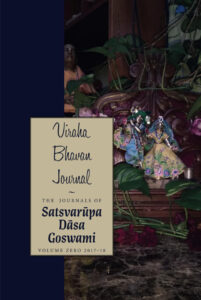
Viraha Bhavan Journal (2017–2018) was written by Satsvarūpa Mahārāja following a brief hiatus in writing activity, and was originally intended to be volume 1 in a series of published journals. However, following its completion and publication, Mahārāja again stopped writing books, subsequently focusing only on what became his current online journal, which began in August of 2018.
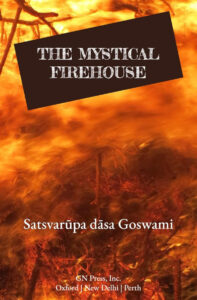
At first, I took it hard that I would have to live surrounded by the firemen, and without my own solitude. After all, for decades I had lived in my own house with my own books and my own friends. I was also now a crippled person who couldn’t walk, living among men who did active duties. But when Baladeva explained it to me, how it was not so bad living continually with other firemen and living in the firehouse with its limited facilities, I came to partially accept it and to accept the other men. I came to accept my new situation. I would live continually in the firehouse and mostly not go outside. I would not lead such a solitary life but associate with the other firemen.
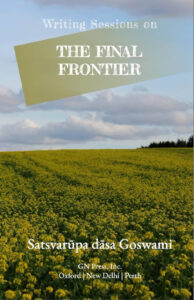
Let me write sweet prose.
Let me write not for my own benefit
but for the pleasure of Their Lordships.
Let me please Kṛṣṇa,
that’s my only wish.
May Kṛṣṇa be pleased with me,
that’s my only hope and desire.
May Kṛṣṇa give me His blessings:
Kṛṣṇa Kṛṣṇa Kṛṣṇa Kṛṣṇa Kṛṣṇa he
Rāma Rāghava Rāma Rāghava
Rāma Rāghava rakṣa mām.
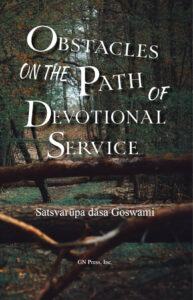
You mentioned that your pathway has become filled with stumbling blocks, but there are no stumbling blocks. I can kick out all those stumbling blocks immediately, provided you accept my guidance. With one stroke of my kick, I can kick out all stumbling blocks. —Letter by Śrīla Prabhupāda, December 9, 1972.
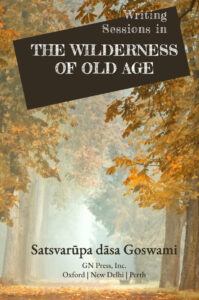
The Writing Sessions are my heart and soul. I’m trying my best to keep up with them. I am working with a few devotees, and they are far ahead of me. I wander in the wilderness of old age. I make my Writing Sessions as best I can. Every day I try to come up with a new subject. Today I am thinking of my parents. But I don’t think of them deeply. They are long gone from my life. Śrīla Prabhupāda wrote a poem when he was a sannyāsī, and he said now all my friends and relatives are gone. They are just a list of names now. I am like that too. I am a sannyāsī with a few friends. I love the books of Śrīla Prabhupāda. I try to keep up with them. I read as much as I can and then listen to his bhajanas.
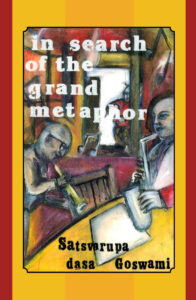
The metaphor is song. Explain it. Yes, particulars may not seem interesting or profound to readers who want structured books.
Wait a minute. Don’t pander to readers or concepts of Art. But Kṛṣṇa conscious criteria are important and must be followed. So, if your little splayed-out life-thoughts are all Kṛṣṇa conscious, then it’s no problem.
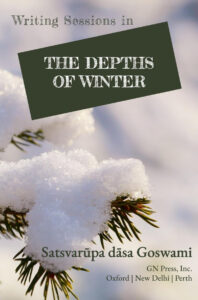
I am near the end of my days. But I do like the company of like-minded souls, especially those who are Kṛṣṇa conscious. Yes! I am prone to Kṛṣṇa consciousness. I have been a disciple of Bhaktivedanta Swami Prabhupāda for maybe almost sixty years. Sometimes I fail him. But I always bounce back and fall at his feet. It is a terrible thing that I sometimes do not have the highest love for him. It is a terrible thing. Actually, however, I never fall away from him. He always comes and catches me and brings me back to his loving arms.

This edition of Satsvarūpa dāsa Goswami’s 1996 timed book, Upstate: Room to Write, is published as part of a legacy project to restore Satsvarūpa Mahārāja’s writings to ‘in print’ status and make them globally available for current and future readers.
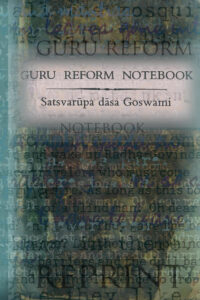
A factual record of the reform and change in ISKCON guru system of mid ’80s.
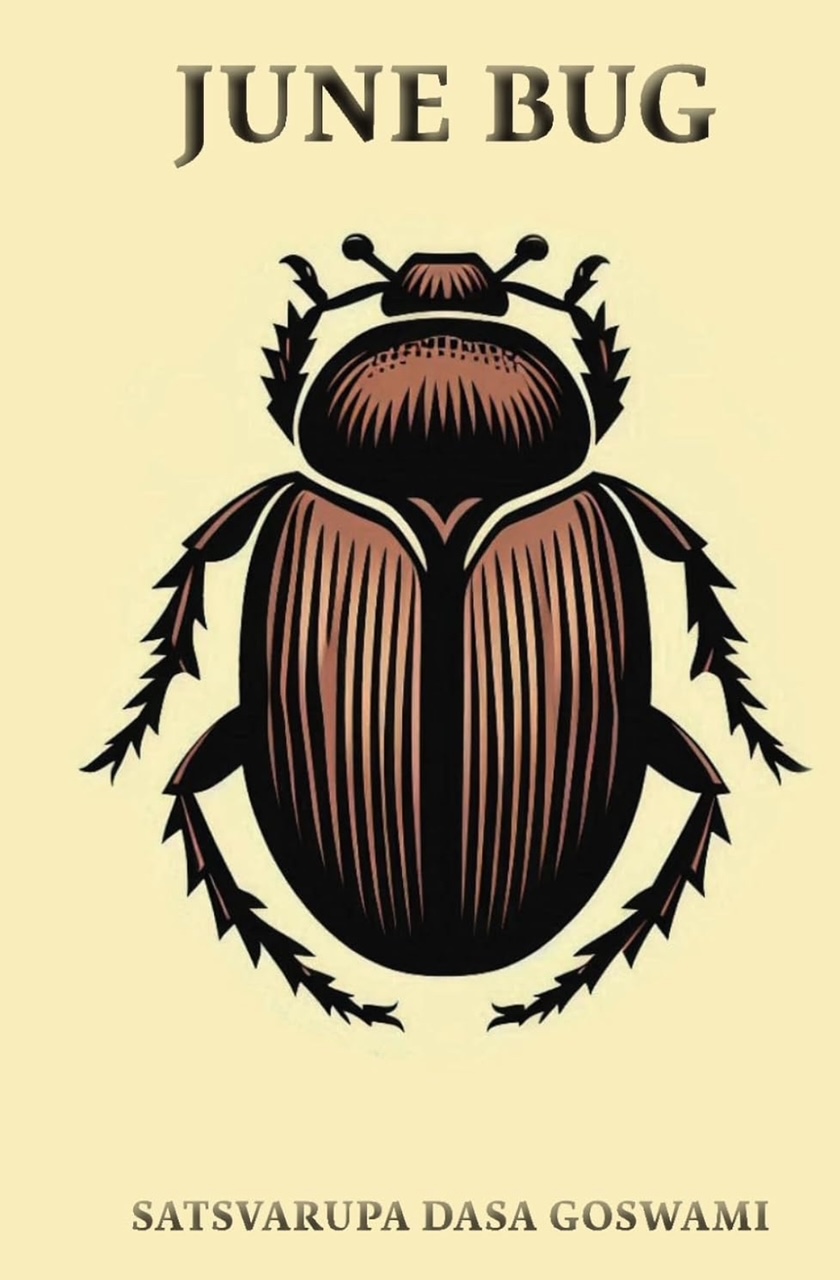
Readers will find, in the Appendix of this book, scans of a cover letter written by Satsvarūpa Mahārāja to the GN Press typist at the time, along with some of the original handwritten pages of June Bug. Together, these help to illustrate the process used by Mahārāja when writing his books during this period. These were timed books, in the sense that a distinct time period was allotted for the writing, during SDG’s travels as a visiting sannyāsī
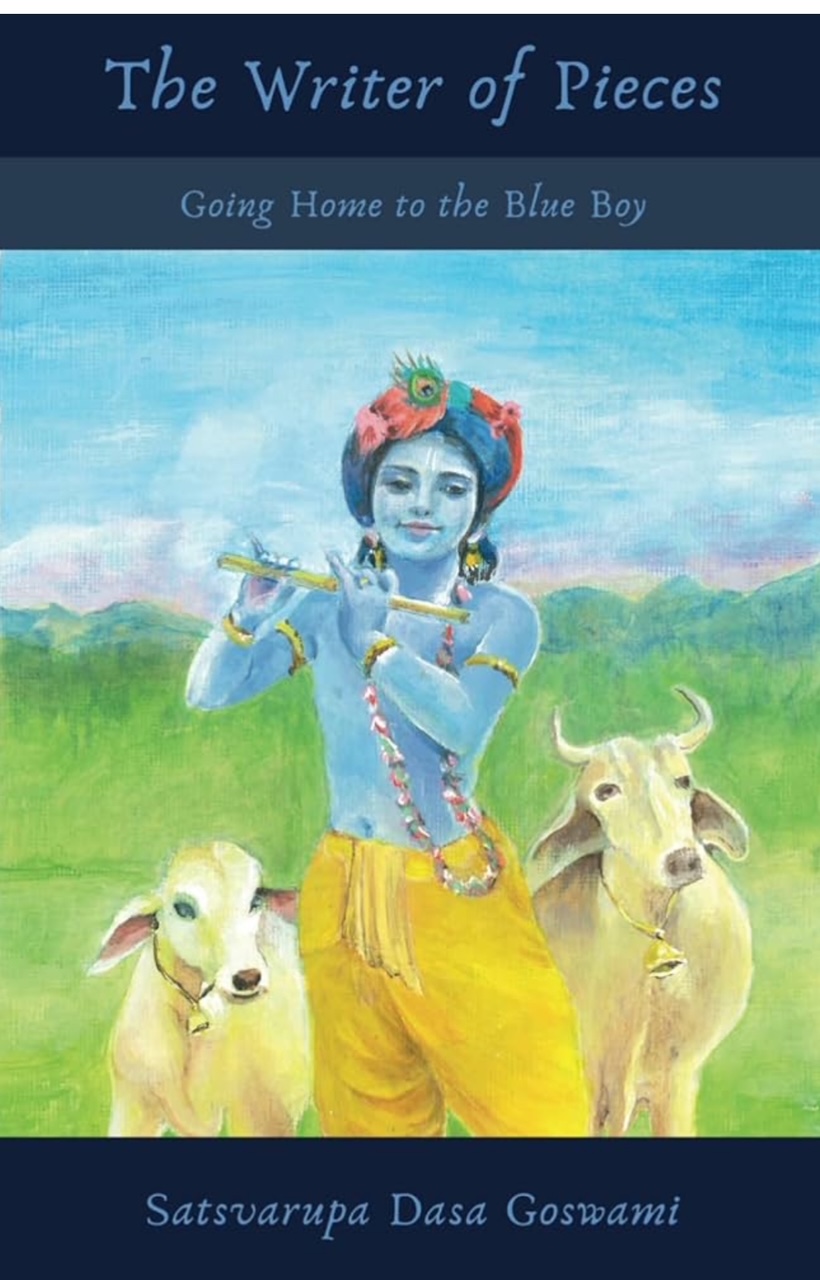
Don’t take my pieces away from me. I need them dearly. My pieces are my prayers to Kṛṣṇa. He wants me to have them, this is my way to love Him. Never take my pieces away.
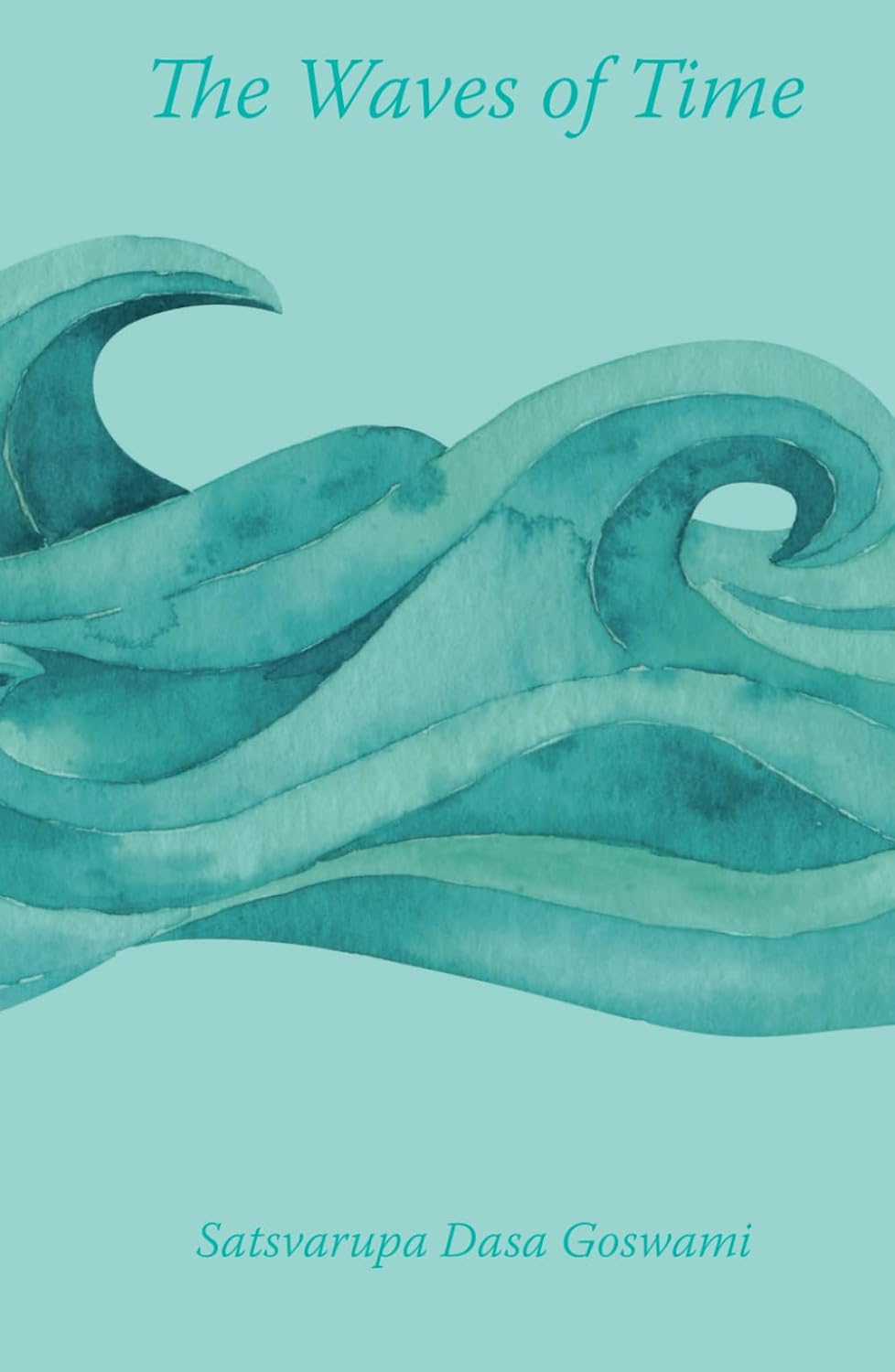
Many planks and sticks, unable to stay together, are carried away by the force of a river’s waves. Similarly, although we are intimately related with friends and family members, we are unable to stay together because of our varied past deeds and the waves of time.

To Śrīla Prabhupāda, who encouraged his devotees (including me) To write articles and books about Kṛṣṇa Consciousness.
I wrote him personally and asked if it was alright for his disciples to write books, Since he, our spiritual master, was already doing that. He wrote back and said that it was certainly alright For us to produce books.

I have a personal story to tell. It is a about a time (January–July 1974) I spent as a personal servant and secretary of my spiritual master, His Divine Grace A.C. Bhaktivedanta Swami Prabhupäda, founder-äcärya of the International Society for Krishna Consciousness. Although I have written extensively about Çréla Prabhupäda, I’ve hesitated to give this account, for fear it would expose me as a poor disciple. But now I’m going ahead, confident that the truth will purify both my readers and myself.

First published by The Gītā-nāgarī Press/GN Press in serialized form in the magazine Among Friends between 1996 and 2001, Best Use of a Bad Bargain is collected here for the first time in this new edition. This volume also contains essays written by Satsvarūpa dāsa Goswami for the occasional periodical, Hope This Meets You in Good Health, between 1994 and 2002, published by the ISKCON Health and Welfare Ministry.

This book has two purposes: to arouse our transcendental feelings of separation from a great personality, Śrīla Prabhupāda, and to encourage all sincere seekers of the Absolute Truth to go forward like an army under the banner of His Divine Grace A.C. Bhaktivedanta Swami Prabhupāda and the Kṛṣṇa consciousness movement.

A single volume collection of the Nimai novels.

Śrīla Prabhupāda was in the disciplic succession from the Brahmā-Mādhva-Gauḍīya sampradāya, the Vaiṣṇavas who advocate pure devotion to God and who understand Kṛṣṇa as the Supreme Personality of Godhead. He always described himself as simply a messenger who carried the paramparā teachings of his spiritual master and Lord Kṛṣṇa.

Dear Srila Prabhupada,
Please accept this or it’s worse than useless.
You have given me spiritual life
and so my time is yours.
You want me to be happy in Krishna consciousness
You want me to spread Krishna consciousness,

This collection of Satsvarūpa dāsa Goswami’s writings is comprised of essays that were originally published in Back to Godhead magazine between 1966 and 1978, and compiled in 1979 by Gita Nagari Press as the volume A Handbook for Kṛṣṇa Consciousness.

This second volume of Satsvarūpa dāsa Goswami’s Back to Godhead essays encompasses the last 11 years of his 20-year tenure as Editor-in-Chief of Back to Godhead magazine. The essays in this book consist mostly of SDG’s ‘Notes from the Editor’ column, which was typically featured towards the end of each issue starting in 1978 and running until Mahārāja retired from his duties as editor in 1989.

This collection of Satsvarupa dasa Goswami’s writings is comprised of essays that were originally published in Back to Godhead magazine between 1991 and 2002, picking up where Volume 2 leaves off. The volume is supplemented by essays about devotional service from issues of Satsvarupa dasa Goswami’s magazine, Among Friends, published in the 1990s.

“This is a different kind of book, written in my old age, observing Kṛṣṇa consciousness and assessing myself. I believe it fits under the category of ‘Literature in pursuance of the Vedic version.’ It is autobiography, from a Western-raised man, who has been transformed into a devotee of Kṛṣṇa by Śrīla Prabhupāda.”
 The Best I Could Do
The Best I Could DoI want to study this evolution of my art, my writing. I want to see what changed from the book In Search of the Grand Metaphor to the next book, The Last Days of the Year.
 a Hare Krishna Man
a Hare Krishna ManIt’s world enlightenment day
And devotees are giving out books
By milk of kindness, read one page
And your life can become perfect.
 Calling Out to Srila Prabhupada: Poems and Prayers
Calling Out to Srila Prabhupada: Poems and PrayersO Prabhupāda, whose purports are wonderfully clear, having been gathered from what was taught by the previous ācāryas and made all new; O Prabhupāda, who is always sober to expose the material illusion and blissful in knowledge of Kṛṣṇa, may we carefully read your Bhaktivedanta purports.

I use free-writing in my devotional service as part of my sādhana. It is a way for me to enter those realms of myself where only honesty matters; free-writing enables me to reach deeper levels of realization by my repeated attempt to “tell the truth quickly.” Free-writing takes me past polished prose. It takes me past literary effect. It takes me past the need to present something and allows me to just get down and say it. From the viewpoint of a writer, this dropping of all pretense is desirable.
 Geaglum Free Write
Geaglum Free WriteThis edition of Satsvarūpa dāsa Goswami’s 1996 timed book, Geaglum Free Write Diary, is published as part of a legacy project to restore Satsvarūpa Mahārāja’s writings to ‘in print’ status and make them globally available for current and future readers.